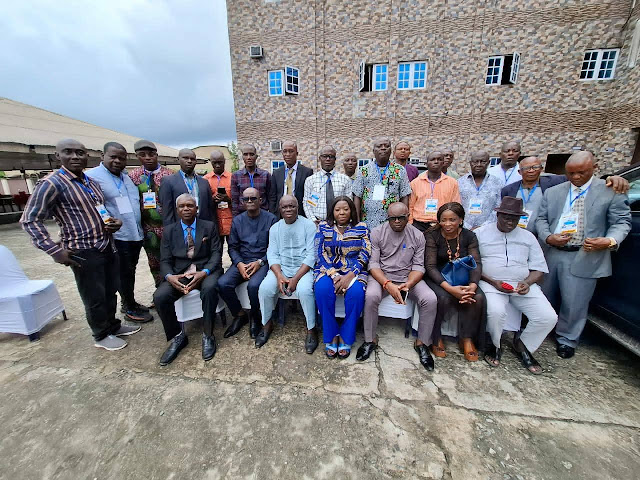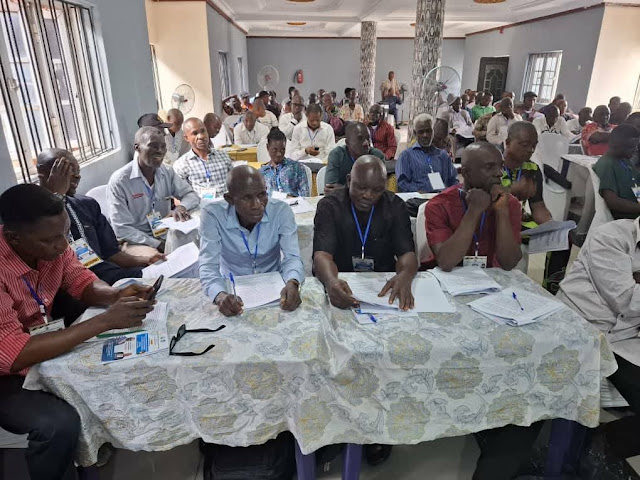In a resolute demonstration of its dedication to fostering a skilled and safety-conscious workforce, the Delta State Local Government Service Commission (LGSC) has reaffirmed its commitment to continuous capacity building through a targeted training program for 100 Works Superintendents, drivers, and mechanics in its employ. The initiative, held on September 2-3, 2025, at the conference hall of Okay Hotels in Ozoro, Delta State, underscores the Commission’s mandate to ensure regular training and retraining of local government staff, equipping them with the tools to excel in their roles and contribute to public safety and efficiency. Organized in collaboration with M.C. Agbamu Agency, the two-day seminar was designed to enhance professional skills, promote road safety, and empower participants to handle emergencies effectively, reflecting the LGSC’s broader vision of building a competent and responsible workforce.
A Strategic Focus on Capacity Building
The Delta State LGSC has long recognized that a well-trained workforce is the backbone of effective public service delivery. The recent training program, titled “Enhancing Professional Driving Skills and Road Safety Awareness with First Aid and Emergency Response (CPR Inclusive),” was a strategic effort to address critical gaps in the skills of its transportation-related personnel. By targeting Works Superintendents, drivers, and mechanics, the Commission aimed to strengthen the operational efficiency of local government services, particularly in the transportation sector, which plays a pivotal role in community mobility and economic activity.
The seminar brought together seasoned resource persons, including experts in road safety, vehicle maintenance, and emergency medical response, to deliver a comprehensive curriculum. The program covered a range of topics, from advanced driving techniques and adherence to traffic regulations to vehicle maintenance protocols and life-saving first aid skills, including cardiopulmonary resuscitation (CPR). This holistic approach reflects the LGSC’s understanding that professional competence extends beyond technical expertise to encompass responsibility, situational awareness, and a commitment to public welfare.
A Call to Professionalism and Responsibility
The training was officially declared open by Hon. Deacon Joseph Otirhue, the LGSC Chairman, who was represented by the Commission’s 2nd Board Member, Princess (Dame) Minnie Igbrude. In her keynote address, Dame Igbrude delivered a compelling message about the critical role of transportation personnel in safeguarding lives and property. “Transportation is the lifeblood of any society,” she declared, emphasizing that those entrusted with driving and maintaining vehicles bear a significant responsibility to ensure safe and efficient mobility. Her remarks underscored the broader societal impact of their roles, positioning them as guardians of public safety.
Dame Igbrude stressed that professional driving is far more than the act of operating a vehicle. “It requires discipline, patience, respect for traffic laws, and continuous improvement of skills,” she said. She described a professional driver as someone who combines technical competence with qualities such as responsibility, courtesy, and sound judgment. These attributes, she argued, are essential for preventing accidents and ensuring that government vehicles, often used to transport officials and resources, operate safely and efficiently.
The Commission’s representative also highlighted the preventable nature of many road accidents in Nigeria. She pointed to a combination of factors—such as disregard for traffic regulations, poor vehicle maintenance, and inadequate emergency response—as contributors to the country’s high accident rates. By equipping participants with the knowledge and skills to address these issues, the LGSC aims to reduce accidents among government workers and set a standard for professionalism in the transportation sector. “Every repaired vehicle, every trip undertaken, and every emergency attended to is an opportunity to uphold the dignity of human life,” Dame Igbrude noted, urging participants to take the training seriously and apply their new skills diligently.
A Timely and Impactful Initiative
The training program was widely described as both timely and impactful, addressing pressing needs in Delta State’s local government workforce. Nigeria’s roads are among the most dangerous in the world, with thousands of lives lost annually due to accidents caused by human error, mechanical failures, or delayed emergency responses. For government employees tasked with operating and maintaining vehicles, the stakes are even higher, as their actions directly affect public safety and the efficient delivery of services.
The inclusion of first aid and CPR training was a particularly significant aspect of the program. In emergencies, the ability to provide immediate medical assistance can mean the difference between life and death. By equipping drivers and mechanics with these skills, the LGSC is ensuring that its workforce is prepared to respond effectively to accidents or medical crises, whether involving passengers, pedestrians, or colleagues. This focus on emergency preparedness aligns with global best practices and reflects the Commission’s forward-thinking approach to workforce development.
Participants were encouraged to engage actively with the training, participating in practical demonstrations and hands-on exercises. These activities were designed to reinforce the lessons and ensure that participants could translate their knowledge into real-world applications. For instance, mechanics were trained on identifying and addressing common vehicle faults that could lead to accidents, while drivers practiced techniques for defensive driving and navigating challenging road conditions. The CPR training included simulations to build confidence in administering life-saving techniques under pressure.
Empowering a Safety-First Culture
The LGSC’s commitment to continuous training reflects its broader goal of fostering a safety-first culture within the local government workforce. By prioritizing capacity building, the Commission is not only enhancing the skills of individual employees but also contributing to the overall safety and efficiency of Delta State’s transportation system. This initiative is particularly significant in a region where infrastructure challenges, such as poorly maintained roads and erratic power supply, exacerbate the risks faced by drivers and commuters.
Dame Igbrude’s charge to participants to “pay close attention to the lessons, practice the demonstrations, and apply the knowledge in their workplaces” was a call to action for employees to take ownership of their professional development. She emphasized that the skills acquired during the training would not only benefit the participants but also have a ripple effect on their communities. A well-trained driver or mechanic, for example, can prevent accidents, reduce downtime for government vehicles, and ensure that public services are delivered without disruption.
The collaboration with M.C. Agbamu Agency was a key factor in the program’s success. The agency’s expertise in organizing training programs ensured that the seminar was well-structured and delivered by qualified professionals. This partnership highlights the importance of leveraging external expertise to complement the LGSC’s efforts, ensuring that participants receive high-quality instruction tailored to their needs.
Broader Implications for Delta State
The training program is part of a larger vision to transform Delta State’s local government system into a model of efficiency and professionalism. By investing in its workforce, the LGSC is addressing one of the root causes of service delivery challenges: a lack of adequately trained personnel. The focus on drivers and mechanics is particularly strategic, given their critical role in facilitating the movement of goods, services, and people across the state.
The initiative also aligns with the Delta State Government’s broader development agenda, which emphasizes human capital development and sustainable growth. Governor Sheriff Oborevwori’s administration has prioritized infrastructure and capacity building, and the LGSC’s training program is a concrete step toward realizing these goals. By equipping employees with modern skills, the Commission is contributing to the state’s efforts to build a resilient and capable workforce.
Moreover, the program has the potential to set a precedent for other states in Nigeria. As road safety remains a national concern, Delta State’s proactive approach could inspire similar initiatives elsewhere, fostering a culture of professionalism and accountability in public service. The emphasis on first aid and emergency response also positions Delta State as a leader in preparing its workforce for the challenges of the modern world.
A Call to Action for Continuous Improvement
The LGSC’s commitment to continuous training signals a long-term strategy to keep its workforce at the forefront of professional excellence. Hon. Deacon Joseph Otirhue, through his representative, reiterated that the Commission would continue to organize such programs to ensure that employees remain competitive and capable of meeting evolving demands. This forward-looking approach is critical in a rapidly changing world, where new technologies and safety standards require constant adaptation.
The training of 100 Works Superintendents, drivers, and mechanics is just one step in a broader journey. By prioritizing capacity building, the LGSC is laying the foundation for a safer, more efficient, and more responsive local government system. The participants, now equipped with enhanced skills and a renewed sense of responsibility, are poised to make a tangible difference in their workplaces and communities.
Conclusion
The Delta State Local Government Service Commission’s recent training program for Works Superintendents, drivers, and mechanics is a testament to its unwavering commitment to workforce development. Through a well-executed seminar focused on professional driving, road safety, and emergency response, the Commission has empowered 100 employees to perform their roles with greater competence and responsibility. The initiative, held in collaboration with M.C. Agbamu Agency, reflects a strategic vision to address critical gaps in skills and promote a safety-first culture.
Dame Minnie Igbrude’s powerful remarks underscored the importance of transportation personnel as guardians of public safety, urging them to embrace discipline, courtesy, and continuous learning. As Delta State continues to navigate its development challenges, the LGSC’s investment in training is a beacon of progress, demonstrating that a skilled and responsible workforce is key to building a prosperous future. This program not only enhances the capabilities of individual employees but also sets a standard for excellence that could inspire similar efforts across Nigeria.








